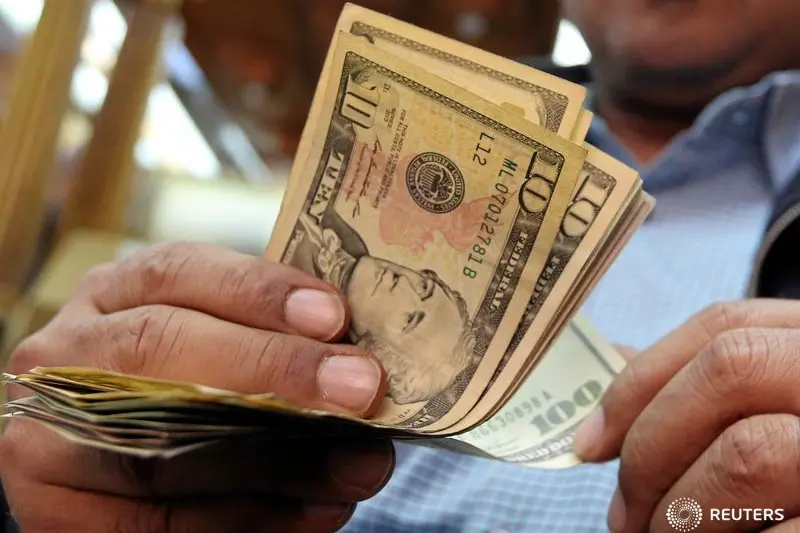PHOTO
The U.S. dollar was just off its highest level in seven weeks on Monday after a rally sparked by Friday's strong U.S. jobs data and an escalation in the Middle East conflict.
The dollar's gains followed a U.S. jobs report that showed the biggest jump in six months in September, a drop in the unemployment rate and solid wage rises, all pointing to a resilient economy and forcing markets to reduce pricing for Federal Reserve rate cuts.
Many factors that weighed on the greenback through the summer had reversed, analysts said, mentioning fading recession concerns and a price action suggesting the limits of pricing a dovish reaction function have been reached with this dataset.
"We cannot see a driver for rebuilding structural U.S. dollar short positions in the next couple of weeks," said Francesco Pesole, a forex strategist at ING.
"Markets appear to have given up on another 50 bps cut, and inflation figures shouldn’t change that, and while the Middle East situation may not spiral further, the consensus seems to be that a material de-escalation isn’t likely for now," he added.
The dollar index measure against major peers was up 0.05% at 102.60. It rose on Friday to a seven-week high at 102.69, logging more than 2% gains for the week, its biggest in two years. It was slightly above 100 early last week.
MUFG flagged that it is the second time the dollar index has fallen back towards support at the 100.00-level in recent years. On the last occasion in July 2023, the greenback index tested but failed to break below the 100.00-level before staging a strong rebound (+7.8%) in the following three months.
"The extent of fiscal stimulus in China, which would mostly help economies outside the U.S., will be one of the main factors affecting the dollar in the short term, along with macro data, which can impact the Fed policy path," said Lefteris Farmakis, forex strategist at Barclays.
China is about to announce the details of its fiscal plan to boost the economy.
In the Middle East, Israel bombed Hezbollah targets in Lebanon and the Gaza Strip on Sunday ahead of the one-year anniversary of the Oct. 7 attacks that sparked its war. Israel's defence minister also declared all options were open for retaliation against arch-enemy Iran.
The euro stood at $1.0970, down 0.06%.
"Effective fiscal measures in Italy and France would benefit the euro on the margin as they strengthen sovereign creditworthiness and therefore the credibility of the euro area project," Barclays' Farmakis argued.
The two countries, that the European Union put under a so-called excessive deficit procedure, are taking measures to reduce their budget deficits.
The yen fell marginally to hit 149.10 per dollar, its weakest level since Aug. 16, before paring losses to trade around 148.60. That came on top of a more than 4% decline last week, its biggest weekly percentage drop since early 2009.
The yen's underperformance has also to do with last week's comments from new prime minister, Shigeru Ishiba, which stoked expectations that rate hikes in Japan are further away.
U.S. 10-year Treasury yields hit a new 2-month high at 4.016%, in London trade.
However, Barclays reckoned they have room to rise by about 20 bps even after accounting for the worst case of downside economic scenarios, arguing that recent jobs data strengthened its conviction in a long and gradual Fed easing cycle.
BofA now forecasts the Fed will cut by 25 bps per meeting until March 2025, and then 25 bps per quarter until end-2025.
Markets expect the Federal Reserve to cut rates by just 25 bps in November, rather than 50 bps, following the jobs data. They now price in a 95% chance of a quarter point cut, up from 47% a week ago, and a 5% chance of no cut at all, according to CME's FedWatch tool
Sterling fell 0.4% against the dollar.
It recorded its biggest daily fall last week since April after Bank of England Governor Andrew Bailey's remarks triggered a substantial unwinding of stretched pound net longs positioning which makes the British currency more vulnerable to shifts in sentiment.
(Reporting by Stefano Rebaudo and Vidya Ranganathan; Editing by Shri Navaratnam, Ed Osmond and Chizu Nomiyama)





















